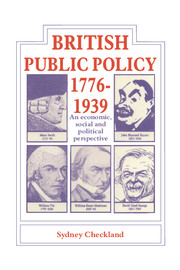Book contents
- Frontmatter
- Contents
- Preface
- Introduction
- Part I Industrialisation and war, 1776–1815
- Part II Assimilating the industrial revolution, 1815–51
- Part III The Victorian apogee, 1851–74
- Part IV Industrial maturity and the ending of pre-eminence, 1874–1914
- Part V Total war and troubled peace, 1914–39
- 14 The policy imperatives of war; the reconstruction debate and the dismantlement of control, 1914–21
- 15 The strains of nationalism: Wales, Scotland and Ireland
- 16 The advent of peacetime macro-economic management
- 17 Micro-management: the restructuring of industry and agriculture; the regions
- 18 Micro-management: the public sector
- 19 The business response
- 20 The political and industrial attitudes of labour
- 21 The welfare share: its elements and adequacy
- 22 Public policy by 1939
- Bibliography
- Index
15 - The strains of nationalism: Wales, Scotland and Ireland
Published online by Cambridge University Press: 05 August 2012
- Frontmatter
- Contents
- Preface
- Introduction
- Part I Industrialisation and war, 1776–1815
- Part II Assimilating the industrial revolution, 1815–51
- Part III The Victorian apogee, 1851–74
- Part IV Industrial maturity and the ending of pre-eminence, 1874–1914
- Part V Total war and troubled peace, 1914–39
- 14 The policy imperatives of war; the reconstruction debate and the dismantlement of control, 1914–21
- 15 The strains of nationalism: Wales, Scotland and Ireland
- 16 The advent of peacetime macro-economic management
- 17 Micro-management: the restructuring of industry and agriculture; the regions
- 18 Micro-management: the public sector
- 19 The business response
- 20 The political and industrial attitudes of labour
- 21 The welfare share: its elements and adequacy
- 22 Public policy by 1939
- Bibliography
- Index
Summary
Land, radicalism and nationalism
The land question had long been basic to English radicalism. It had been so also to Irish nationalism, and, to a lesser degree, to that of Wales and Scotland. But in the course of the inter-war years land largely passed from the radical and nationalist agendas in all four countries. In England and Wales it was largely eclipsed by unemployment and the conflicts between labour and industrial capital. The land question lingered in Scotland in the form of crofters' grievances, but did so only remotely. In Ireland both radicalism and nationalism had been largely detached from the land question. By 1929, due to the operation of the successive Land Acts of the British parliament, 97.4% of those working the land in Ireland were owner-occupiers. Indeed the Land Acts had helped to create a deeply conservative peasantry who, though it could be revolutionary in a nationalist sense, was not so in a social or political sense.
But though nationalism in the United Kingdom had been in a sense simplified by the fading of the land question, it was beginning to become complicated anew by the challenge, on what basis should an independent Scotland, Wales or Ireland rest? There were two general possibilities. One was to identify an intrinsic national character as formed in the traditions of the people, and to base a society upon it. This was the path of Ireland with its ancient culture, its Roman Catholic religion and its small peasant proprietors.
- Type
- Chapter
- Information
- British and Public Policy 1776–1939An Economic, Social and Political Perspective, pp. 277 - 281Publisher: Cambridge University PressPrint publication year: 1983



